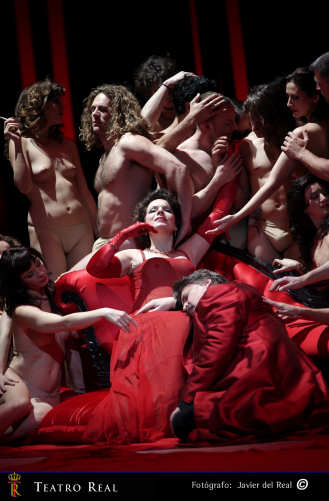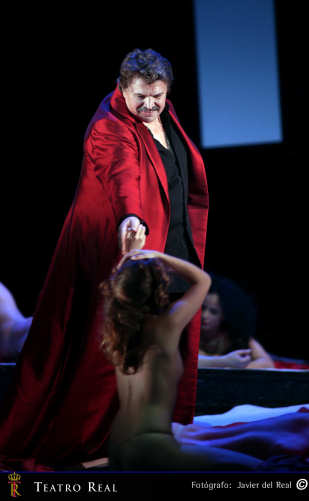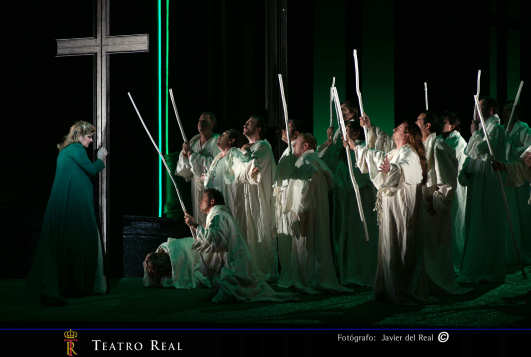Other Links
Editorial Board
-
Editor - Bill Kenny
-
Deputy Editor - Bob Briggs
Founder - Len Mullenger
Google Site Search
SEEN AND HEARD INTERNATIONAL OPERA REVIEW
Wagner, Tannhäuser:
Soloists, Orquesta y Coro de la Sinfónica de Madrid,
Conductor: Jesús López Cobos,
Teatro Real de Madrid.
21 & 23.
3.2009 (JMI)
These performances of Tannhäuser at the Teatro Real have
received an unusual response from the media due to the fact that the
production included numerous naked extras during the bacchanal
scene. Apparently, this is the only aspect of the opera that held
any interest for the media, which was at pains to make it seem as if
we were going to witness a great scandal on the stage of the Teatro
Real. Poor Wagner! He occupied the front pages not as a composer,
but as a vehicle for strippers.
Production from Los Angeles Opera.
Direction: Ian Judge.
Sets and Costumes: Gottfried Pilz.
Lighting: Mark Doubleday.
Cast:
Tannhäuser: Peter Seiffert/Robert Gambill.
Elizabeth: Petra Maria Schnitzer/Edith Haller.
Wolfram: Christian Gerhaher/Roman Trekel.
Landgrave: Günther Groissböck.
Venus: Lioba Braun/Anna-Katherina Behnke.
Walther: Stephan Rügamer.
Biterolf: Felipe Bou.
Heinrich: Joan Cabero.
Reinmar: Johann Tilli.
Shepherd: Sonia de Munck.

This production by Ian
Judge was premiered in Los Angeles two years ago, but did not much impress
conservative American society. The action was transferred to the last century,
which does not matter much since we are dealing with legend or myth and these,
independently of historical origins, are timeless. Mr Judge’s production told
the story well enough, although it seemed to me to be a pretentious work and
rather superficial. Of course, in the famous bacchanal Mr Judge stays totally on
the surface of things. It is certain that a bacchanal is not normally a
religious function and, therefore, there is nothing particularly strange about
using it to show an orgy on stage (in fact we have seen this sort of thing time
and again).
From then on the production worked as a pure game of colours. Act II is staged
in simple black and white, which from my point of view lost a great deal of
intensity, and the direction of the chorus on stage was poor. For the last act,
the dominant colour changed to green, with the exception of Venus and her
beautiful cohort of naked bodies. The sets consisted of two independent turning
modules with a profusion of doors.
Peter Seiffert continues to be one of the best interpreters of Tannhäuser
around. His voice has not lost any brightness and he retains all his familiar
expressiveness, besides to be able to cope perfectly with the tessitura of the
character. His biggest problem is that signs of fatigue in the top register are
becoming too evident and the wide vibrato starts to get annoying.
In the second cast we had the American Robert Gambill, who is also in
worrying vocal shape. Singing the very heavy Wagner roles over the past few
years has taken a big toll on his voice and today he is just a shadow of what he
once was. The unsteadiness of his voice is too great for a tenor at 59.
Some readers will be aware of the scandal in Paris at the premiere of this opera
in 1861, where the scandal was not due to use of the term ‘bacchanal’, nor for
the presence of naked bodies (there were none) but by the location of the ballet
in the first act. Let me emphasize the word ballet, because the bacchanal
is exactly that - a ballet, although you don’t need to dance it while wearing
tutus. A ballet is a physical means of expression, while an exhibition of the
sort we were presented with is something entirely different. In this production
Ian Judge simply eliminates any ballet, and instead has extras stripping on
stage. This might be pleasant to look at, but it is not what Wagner intended.

A modern production these days seems as though it must
offer some “originality”, at all costs, even if it is
purely gratuitous. In this case Mr Judge brings Venus back to the stage at the
end of the opera to take Wolfram to the Venusberg. About this, I will make
Jesus Lopez Cobos
has been unusually prominent lately in the newspapers due to his public comments
about his disagreements with the board of Teatro Real and his negative view of
the musical direction that Mortier intends to repeat here (following his time in
Paris). Apart from making these press statements he took up his baton and
conducted this Tannhäuser and, once again Lopez Cobos has been faithful
to himself. Everything was under control, there were no surprises and the
reading was efficient but short of life and inspiration. After a bland overture
and a lifeless Venusberg, things improved throughout the performance, the third
act being best. The Orchestra gave a good performance in line with what we are
used to in this theatre, although the gentleman seated next to me came from
Prague and he found the orchestra rather poor. The Chorus has also been in the
media, this time due to labour disputes. They were very warmly applauded,
although I thought they were not outstanding. Again, it all depends on what you
are used to.

Over the past few years Petra Maria Schnitzer has made astonishing progress in
vocal terms. When she first began to play the lighter Wagner roles I found her
too light a soprano, but this is not the case any more. Last year she was a good
Elizabeth at the Barcelona Liceu and now she has again given a performance
confirming this positive trend. Today she is an outstanding Elizabeth, with only
the Prayer falling short of the usual excellence. In the second cast we had the
young Tyrol-Italian soprano Edith Haller, who gave an interpretation in line
with what we heard from Ms Schnitzer. Ms Haller is more than just a promising
soprano and she was at her best at the end of Act II while, again, the Prayer
was the weakest point.
To sing Wolfram is a gift for any baritone. Wagner gave this character some of
the most beautiful pages he ever composed. What is needed is a great singer with
a real feeling for lieder, who knows how to express emotions with controlled and
perfectly internalised singing and the casting of Christian Gerhaher in the role
was a total success. Gerhaher was a sublime and superb Wolfram. That Ian Judge
chose to punish him with the Venusberg instead of promoting him to heaven is
more than just a contradiction. Mr Antonio Moral has offered to us a true dream
Wolfram and congratulations are due to both of them. Roman Trekel has been
specialising in this beautiful role recently and he continues to be a great
Wolfram, particularly in the Song to the Star - but who could forget what
Gerhaher had given us the day before?
As in Barcelona last year, Günther Groissböck was perfectly suited to the role
of the Landgrave. Lioba Braun was a good Venus, but
Anna-Katherina Behnke had problems in her upper registers, despite her age.
Stephan Rügamer sang well as Walther, as
did Felipe Bou as Biterolf. Act II was given, as
usual, in the Dresden version.
There was a full house for both performances. There were cheers for Gerhaher,
Seiffert and Schnitzer in the first cast, and for Haller and Trekel in the
second. López Cobos was much better received after the second performance.
José M Irurzun
Pictures ©
Javier del Real
Back
to Top
Cumulative Index Page
